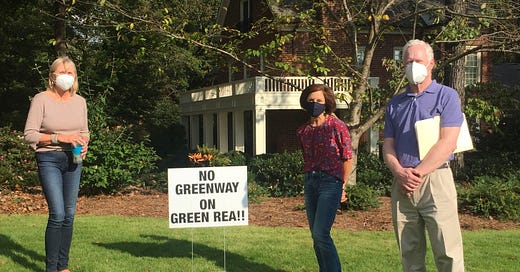County re-examines greenway plans amid opposition
Plus: Failing grades in CMS double under remote learning; How Mecklenburg Covid deaths compare with elsewhere; $16M South End land deal; Beer exec named Charlotte FC president
Good morning! Today is Wednesday, December 16, 2020. You’re reading The Charlotte Ledger, an e-newsletter with local business-y news and insights for Charlotte, N.C.
New options for south Charlotte route after neighbors raise parking and traffic concerns; Parks official: ‘We have heard you loud and clear’
by Tony Mecia
Mecklenburg County parks officials are looking at revising plans for a hotly debated section of a south Charlotte greenway, after residents in a neighborhood off Carmel Road said they don’t want to be linked to the trail.
More than 100 residents attended an online meeting Monday night to hear about the updated plans — the largest parks meeting since public gatherings went virtual during the pandemic, officials said.
At issue is the route of a planned extension to the McAlpine Creek Greenway near Pineville-Matthews Road. The county had intended to extend the greenway from Johnston Road to Pineville-Matthews Road, then continue another ¾ of a mile along the creek and connect to Green Rea Road, near Charlotte Country Day’s middle school campus and Carmel Country Club.
But county parks officials on Monday suggested they might backtrack from plans to build that final ¾ of a mile, because residents in the neighborhood off Green Rea Road object to being connected to the greenway. The neighborhood contains more than 100 single-family homes, many of them on the Carmel Country Club golf course, that are valued in the range of $600,000 to more than $2M.
They cite concerns about traffic and parking, which they say are already problems because of the presence of the middle school. There’s no room for a parking lot at the proposed trailhead, but residents worry people from elsewhere would park on narrow neighborhood streets, create traffic hazards and block emergency vehicles.
It’s unusual for neighborhoods to oppose being connected to greenways, though a similar situation took place a few years ago involving Park Crossing, off Park Road near South Mecklenburg High School.
The Ledger first reported on the neighborhood’s objections (and the Park Crossing situation) in October. Neighbors have put up signs saying, “No greenway on Green Rea!!”
Helen Verkamp (left) and Ingrid and John Amols are among more than 100 residents in a south Charlotte neighborhood who worried that a connection to the county’s greenway network will cause headaches with traffic and parking. (Ledger file photo from October.)
The county has a master plan that calls for 308 miles of greenway trails. It currently has about 57 miles, with a goal of adding 30 more miles by the end of 2023. The timing on this section is unclear: The county is still in the planning and land-acquisition phase. A future project would connect this portion of the greenway with a completed section to the northeast, near Providence Road.
If the county decides not to extend the greenway to Green Rea, it has two other viable options, planners said. It could create the path as a loop on each side of the creek, like this:
Or simply cut off that ¾ of a mile extension on the northern side of Pineville-Matthews Road, like this (Green Rea Road is in the upper right of each map):
“We don’t have our minds made up,” said Bert Lynn, the director of capital planning with the Mecklenburg County Park and Recreation Department. “We had in our initial scope of the project to continue to Green Rea Road and try to connect to as many neighborhoods as possible. If we continue to have overwhelming opposition to an access at that point, that is going to help inform the scope of the project and where we move forward from here.”
Asked if he had heard the neighborhood’s concerns, Lynn replied at the meeting: “To date, we have heard you loud and clear.”
There seems to be overwhelming opposition in the neighborhood, though people at the meeting who lived elsewhere seemed to support the connection.
In the chat section of the Zoom meeting, resident comments included:
“Come to Green Rea Rd during any weekday and see the Country Day Middle School traffic and the landscapers/workers all parked on the road every day. It already is a traffic and safety issue for those of us who walk the neighborhood. Any add would be problematic.”
“There will be very strong [and] most certainly legal opposition if Green Rea Road access stays in the discussion.”
But others said they were OK with the idea:
“Connections are critical for the good of all users of the greenway.”
“If we stopped building greenways every time we heard NIMBY complaints, we wouldn’t have any greenways.”
Eric Zaverl of the group Sustain Charlotte said greenways are a public benefit that should not be blocked by a single neighborhood: “Traffic and parking on one street shouldn’t dictate how we build our greenways.”
County parks officials are expected to meet next month to decide on next steps.
Related Ledger articles:
“South Charlotte neighborhood opposes greenway connection” (Oct. 19)
“South Charlotte greenway battle, Part 2: The lawsuit at Park Crossing” (Oct. 21 🔒, 3rd item)
Number of CMS students with failing grades doubles
About 1 out of every 7 students enrolled in Charlotte-Mecklenburg Schools had an “F” in at least one subject in the first quarter of 2020-21 school year — about double the number who had a failing grade one year earlier.
The numbers suggest that the district’s shift to remote learning is resulting in more failing grades. The district’s K-12 students were in full remote learning throughout the first quarter, which ended in October. Elementary school students returned to classrooms part-time the first week of November.
According to an executive summary CMS provided to The Ledger on Tuesday, 37,665 students, or 14.4%, failed at least one course or subject in the first quarter of the 2020-21 school year.
One year ago, during the first quarter of the 2019-20 school year, 7.1% of students — or 18,887 — received an “F” on their report card.
The CMS executive summary said the reasons for the F’s “varied from student to student. Primarily students failed courses or subjects due to low overall course performance or an abundance of missing assignments. The reasons for those missing assignments can be attributed to any number of reasons.”
The document didn’t give school-by-school breakdowns, but it did include the school with the highest percentage of students failing, and six schools where no students received failing grades.
Martin Luther King Jr. Middle School in northeast Charlotte had 88% of students with at least one “F.”
Schools with no students failing a course or subject were: Cato Middle College, Cornelius Elementary, Hickory Grove Elementary, Metro School, Sterling Elementary and Trillium Springs Montessori.
All CMS students will remain in full-remote learning until at least Jan. 19. The CMS school board voted last week to close buildings to students because of a spike in coronavirus cases in Mecklenburg County.
The CMS document listed some steps the district is taking to get students’ grades up during the second quarter (which ends on Monday), including having teachers do one-on-one check-ins with students who have missing work, clearly posting assignment lists and due dates in the “Canvas” app the district uses to track assignments, allowing students to make up first-quarter work during the second quarter, and scheduling parent-teacher conferences.
In an email to The Ledger, CMS spokesman Brian Hacker added:
The first quarter grades report is the beginning, not the end, of evaluating the remote learning experience. The report makes evident gaps in students’ understanding of key concepts. CMS’ teaching and learning practices must adapt to the new realities brought about by the ongoing pandemic.
That said, we know remote learning in some form will likely be a part of our educational offering from this point forward; we will use the information from this report as the basis from which to evaluate our remote teaching and learning practices. And we will refine them to make sure our students understand and master the concepts the coursework is designed to convey. We’ve already begun to look inward and have identified several short- and long-term action steps schools are using to help drive student mastery.
Also, we understand that many districts around the country have identified similar concerns. As we work internally to make improvements, we will consult with peers throughout the country to make sure we bring all the best thinking to the table.
The school board has not publicly discussed the academic results under remote learning. During last week’s CMS school board meeting in which the board voted 6-3 to return the district to full-remote learning, CMS superintendent Earnest Winston, in response to a question, said students’ first-quarter grades were “of concern,” but he gave no specifics on how they differed from a typical year. He said the increases in D’s and F’s mirror those that other districts have experienced. —CB
[Read the CMS memo on first-quarter grades]
Compared with elsewhere, Mecklenburg Covid’s deaths are low
by Steve Harrison and Tony Mecia
Mecklenburg County has one of the lowest Covid-19 death rates among the 100 largest U.S. counties, according to analysis by The Charlotte Ledger and WFAE.
As of early December, Mecklenburg had about 40 deaths per 100,000 people. That ranked as #78 of the biggest 100 counties.
The counties with the highest death rates were hit hardest in the first phase of the pandemic, in places like New York, Michigan and New Jersey. Hudson County, N.J., for instance, has a death rate of more than 230 per 100,000 people — nearly six times more deaths per capita than Mecklenburg.
But there are other areas hit by the virus later that have seen more deaths than Mecklenburg.
When looking at deaths per 100,000 people, Fulton County, Ga., (Atlanta) has seen 67 deaths; Bexar County, Texas (San Antonio) has had 75 deaths; Denver County, Colo., (Denver) has seen 74 deaths.
Mecklenburg Deputy Health Director Raynard Washington said the county has been fortunate so far. He said the county has been able to keep its Covid deaths relatively low by having what he said is a “laser focus” on keeping the virus out of nursing homes.
“Most jurisdictions that saw huge upswings in deaths (had outbreaks) in long-term care facilities,” Washington said. “A lot of the death was driven by quick spread by very vulnerable populations. We have been laser focused on long-term facilities.”
He also said most of the county’s transmission is among young adults, who are at far less risk from the coronavirus than people over 65.
Washington, however, noted that cases and deaths in Mecklenburg are on the upswing, just as they are across the country.
Ahmed Arif, an epidemiology professor at UNC Charlotte, says he thinks the lower rate could be because of “better management and treatment of Covid-19 patients” here. In addition, while he says he has not examined data from other counties, “I would suspect these counties are more densely populated than Mecklenburg.”
Steve Harrison is a reporter at WFAE. Tony Mecia is executive editor of The Ledger.
Big South End land deal
A building in South End across South Church Street from the restaurants Let’s Meat and Seoul Food Meat Co. has sold to a developer of apartments and multi-use projects.
A company affiliated with Haven Communities of Atlanta bought the building at 1415 S. Church St., which is on 1.9 acres of land, for $15.5M, property records show. On its website, Haven says it is a “developer of multifamily, student housing, and mixed-use developments across the United States.”
The parcel is zoned TOD-UC, an urban transit designation that allows buildings of up to 130 feet by right, or up to 300 feet with bonuses. The building is home to A Shade Above, a window treatment store.
We reached out to Haven Communities last night, after we learned about the sale, but did not receive an immediate reply to questions about plans for the site. No offense to A Shade Above, but out-of-town housing developers don’t typically pay $16M to collect rent from curtain-and-shade retailers. —TM
In brief
Providence Day in New York Times: Providence Day School expelled a Black 9th grader after his mom complained about the inclusion in his English curriculum of a play with racial themes and called the school’s director of equity and inclusion “a disgrace to the Black community.” The mom, a lawyer, said that “instead of addressing the issue” that Providence Day was “trying to make me seem like an angry, ranting Black woman.” A school spokeswoman said the student’s mother had a history of making “toxic” statements about faculty and others at the school and that Providence Day expects members of its community, including parents, “to engage in civil discourse around topics that they might not necessarily agree on.” Providence Day’s head of school gave a more complete reply on the school’s Facebook page on Tuesday night. (New York Times)
North Mecklenburg skeptical of transit plan: Several elected leaders in northern Mecklenburg County say they oppose the proposed sales tax increase needed for a county transit plan. They say they were previously promised a light rail line between Davidson and uptown, which has never materialized. Huntersville Mayor John Aneralla says he opposes the plan, and Elaine Powell, who represents the north on the county commission, said Tuesday that “it’s offensive to so many people who live in my district.” (WBTV)
Atrium doc gets first shot in N.C.: The first person in North Carolina to receive the Covid vaccine was Dr. Katie Passaretti, Atrium Health’s medical director of infection prevention. She said she was “excited” and felt “perfectly fine” after receiving the shot. (WBTV)
From beer exec to soccer president: Charlotte’s new Major League Soccer team, Charlotte FC, named Anheuser-Busch InBev marketing executive Nick Kelly as the team’s president. Kelly, 37, spent six years at AB InBev, most recently as its “vice president of partnerships, beer culture, and community.” (Agenda, first reported by Sports Business Daily)
Mill sale: A company affiliated with Portman Residential of Atlanta has bought Savona Mill in the Seversville neighborhood north of uptown. The mill and the surrounding land sold for $11.5M. (Biz Journal)
McCrory aide to head community colleges: The State Board of Community Colleges named Thomas Stith as its system president. Stith heads the Small Business Administration’s North Carolina division and was chief of staff to former Gov. Pat McCrory. (WRAL)
Houses selling like hotcakes: Mecklenburg’s hot real estate market continued in November, with the number of closings up 11% compared with a year earlier and the median sales price up 13%, to $310,000. (Canopy Realtor Association)
Living in a hybrid world: Red Ventures CEO Ric Elias, speaking at the annual outlook conference of the Charlotte Regional Business Alliance, said the biggest change in the next 5 or 10 years will be adapting to a “hybrid world” or online and in-person interaction: “Those who want to hold on to the past I think are going to kind of be left behind. And those who move too quickly to assume that humans don’t want interactions are also going to overshoot the runway.” (WFAE)
New SouthPark steakhouse: Steak 48 opens at the new Apex SouthPark development on Friday.
Ledger holiday party TOMORROW
Our community of paying subscribers is invited to our first-ever reader holiday party. Drop in online on Thursday, Dec. 17, from 5-7 p.m. All the details are here, including the scoop on a beer 🍺 and wine 🍷 discount we’ve arranged with Divine Barrel Brewing — which delivers throughout Mecklenburg County. We’re using a tech platform that’s better for multiple small-group conversations than Zoom is.
Look for a reminder email tomorrow around lunchtime. We hope to see you there!
Additional Ledger announcements:
Gift subscriptions. Why not drop some local-news knowledge on a friend or loved-one this holiday? What says “I love you” more than a $99 yearly subscription? Also available at the “I like you” $9 level for one month. You can schedule delivery for a future date and time.
Ledger gear. It’s too late to guarantee Christmas delivery, but it’s never too late to mark yourself as “essential” with a Ledger hoodie or crewneck sweatshirt — or a T-shirt.
Charitable giving. If you’re thinking about making an end-of-the-year gift, check out our list of local charities recommended by The Ledger’s community of paying subscribers.
Programming note: Ledger editor Tony Mecia appears as a guest on 90.7 WFAE at 6:40 a.m. and 8:40 a.m. on Thursdays for a discussion of the week’s local business news in the station’s “BizWorthy” segment. Audio and transcripts are also available online.
Need to sign up for this e-newsletter? We offer free and paid subscription plans:
The Charlotte Ledger is an e-newsletter and website publishing timely, informative, and interesting local business-y news and analysis Mondays, Wednesdays, Fridays and Saturdays, except holidays and as noted. We strive for fairness and accuracy and will correct all known errors. The content reflects the independent editorial judgment of The Charlotte Ledger. Any advertising, paid marketing, or sponsored content will be clearly labeled.
Got a news tip? Think we missed something? Drop us a line at editor@cltledger.com and let us know.
Like what we are doing? Feel free to forward this along and to tell a friend.
Searchable archives available at https://charlotteledger.substack.com/archive.
Social media: On Facebook, Instagram, Twitter and LinkedIn.
Nab an “Essential Charlotte Ledger” T-shirt or hoodie.
Sponsorship information: email editor@cltledger.com.
Executive editor: Tony Mecia; Managing editor: Cristina Bolling; Contributing editor: Tim Whitmire, CXN Advisory; Reporting intern: David Griffith





